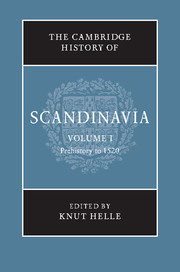Book contents
- Frontmatter
- Introduction
- PART I THE GEOGRAPHY AND PREHISTORY OF SCANDINAVIA
- PART II FROM VIKINGS TO KINGS
- PART III MATERIAL GROWTH (to c. 1350)
- PART IV THE HIGH MEDIEVAL KINGDOMS
- 12 Towards nationally organised systems of government
- (a) Introductory survey
- (b) The Danish kingdom: consolidation and disintegration
- (c) The Norwegian kingdom: succession disputes and consolidation
- (d) Sweden under the dynasty of the Folkungs
- (e) Growing inter-Scandinavian entanglement
- 13 Church and society
- PART V HIGH AND LATE MEDIEVAL CULTURE
- PART VI LATE MEDIEVAL SOCIETY (c. 1350–1520)
- PART VII SCANDINAVIAN UNIONS (1319–1520)
- Conclusion
- Select bibliography: primary sources, general surveys and secondary works arranged by part
- Index
- Plate Section"
- References
(a) - Introductory survey
from 12 - Towards nationally organised systems of government
Published online by Cambridge University Press: 28 March 2008
- Frontmatter
- Introduction
- PART I THE GEOGRAPHY AND PREHISTORY OF SCANDINAVIA
- PART II FROM VIKINGS TO KINGS
- PART III MATERIAL GROWTH (to c. 1350)
- PART IV THE HIGH MEDIEVAL KINGDOMS
- 12 Towards nationally organised systems of government
- (a) Introductory survey
- (b) The Danish kingdom: consolidation and disintegration
- (c) The Norwegian kingdom: succession disputes and consolidation
- (d) Sweden under the dynasty of the Folkungs
- (e) Growing inter-Scandinavian entanglement
- 13 Church and society
- PART V HIGH AND LATE MEDIEVAL CULTURE
- PART VI LATE MEDIEVAL SOCIETY (c. 1350–1520)
- PART VII SCANDINAVIAN UNIONS (1319–1520)
- Conclusion
- Select bibliography: primary sources, general surveys and secondary works arranged by part
- Index
- Plate Section"
- References
Summary
The main tendencies in the development of Scandinavian political organisation in the high Middle Ages were centralisation and growth of public authority under the monarchy, the Church, and the secular aristocracy. As a result the three Nordic kingdoms grew into more state-like entities. This chapter outlines their development until 1319, when the first of the Nordic unions was established between Norway and Sweden and the death of King Erik Menved ushered in the temporary disintegration of the Danish kingdom.
Political developments in the twelfth and thirteenth centuries can most easily be followed in Norway and Iceland, thanks to the rich Norse-Icelandic historiography comprising vernacular sagas and political literature dealing with contemporary or near-contemporary events. It should also be noted that Norwegian provincial laws and the law of the Icelandic Free State, Grágás, are known in redactions that are earlier than extant Danish and Swedish law-texts; they may largely be said to be representative of the twelfth and early thirteenth centuries, and seem to contain provisions going back to the earliest recording of laws in Norway in the eleventh century and in Iceland in the early twelfth century. In Norway extensive royal legislation followed from the mid-thirteenth century, resulting in the monumental national law-codes of King Magnus ‘Law-mender’ from the 1270s, which were also adapted to Icelandic conditions, and a relative wealth of royal decrees issued by his sons.
Keywords
- Type
- Chapter
- Information
- The Cambridge History of Scandinavia , pp. 343 - 352Publisher: Cambridge University PressPrint publication year: 2003

